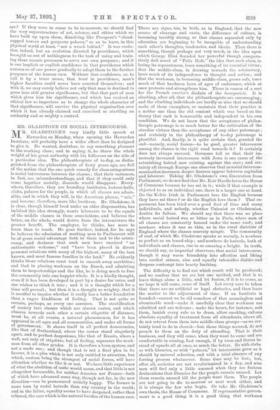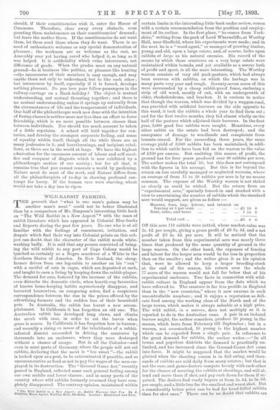MR. GLADSTONE ON SOCIAL INTERCOURSE.
MR. GLADSTONE'S very kindly little speech at Hawarden on Monday, when opening the Hawarden Institute, will probably have a wider effect than he designed to give it. He wanted, doubtless, to say something pleasant to the working class ; and in saying it, he threw the whole weight of his great authority with his followers on the side of a particular idea. The philanthropists of to-day, as distin- guished from the philanthropists of forty years ago, are full of the notion that the one quick remedy for class antagonisms is social intercourse between the classes ; that their variances, in fact, are misunderstandings, and that if they could only come together socially, discords would disappear. Every- where, therefore, they are founding institutes, lecture-halls, clubs, palaces for the people, in which all classes are admis- sible, and in which they will, in the American phrase, "mix," and become, therefore, more like brethren. Mr. Gladstone, it is clear, though himself bred under an elder dispensation, has imbibed this idea strongly, wants labourers to be the equals of the middle ()lasses in these associations, and believes the latter, on the whole, would derive from the intermixture the greater benefit. The employer, he thinks, has more to learn than to teach. He goes further, indeed, for he says he believes the admission of working men to Parliament will be of great social advantage both to them and to the aristo- cracy, and declares that such men have received "an enthusiastic welcome," and "have been placed in direct personal relations with many of the highest, many of the best known, and most famous families in the land." He evidently thinks those relations must tend to smooth away acerbities ; and that in placing workmen on the Bench, and admitting them to inspectorships and the like, he is doing much to fuse the community into one happier whole. It is a kindly thought, even if it has been developed in part by a desire for votes, and one wishes to think it true ; and it is a thought which for a time will prevail ; but then it is a thought so weighty, that it is needful to inquire whether it really has a better foundation than a vague kindliness of feeling. That is not quite so certain, perhaps, as every one assumes. The stratification of society into classes which are almost castes, and which observe towards each other a certain etiquette of distance, must be, at all events, a natural phenomenon, for it has appeared in all ages and all communities, and under all forms of government. It shows itself in all perfect democracies, like that of Switzerland, where the castes stand singularly apart, and in perfect despotisms, like that of Russia, where a wall, not only of etiqtrette, but of feeling, separates the work- man from all other grades. It is therefore a born system, and not a made one ; and though that is not a final plea in its favour, it is a plea which is not only entitled to attention, but which, custom being the strongest of social forces, will have attention whether we like it or not. We have little experience of what the abolition of caste would mean, and that little is not altogether favourable, for neither America nor France—both of which have advanced some way, though not far, in the new direction—can be pronounced socially happy. The former is more torn by social hatreds than any country in the world; and in the latter, equality seems to have deepened, rather than relieved, the care which is the natural burden of the human race. There are signs, too, in both, as in England, that the new source of cleavage and caste, the difference of culture, is becoming terribly-strong, so that classes separated only by education are beginning to be incapable of understanding each other's thoughts, tendencies, and ideals. Then there is something, though perhaps not very much, in the idea upon which George Eliot 'founded her powerful though compara- tively dull novel of "Felix Holt," the idea that each class, in losing its separateness, loses something of its essential virtue ; that the middle-class, in drawing towards the aristocracy, loses much of its independence in thought and action ; and that the workman, in becoming middle-class, grows soft, loses much of that hardness born of ages of endurance, which at once protects and strengthens him. There is reason of a sort for the French ouvrier's disdain of the bourgeoisie. It is climbing, after all, that the philanthropists are encouraging; and the climbing individuals are hardly so nice that we should make of them exemplars, or maintain that their practice is a nobler one than the old content which was based on the theory that each is honourable and independent in his own condition. We do not know that the acceptance of philan- thropic patronage is so much better for the cultivation of the sturdier virtues than the acceptance of any other patronage ; and certainly in the philanthropy of to-day patronage is plentiful. And, finally, is it quite certain that, granted the end—namely, social fusion—to be good, greater intercourse among the classes is the right road towards it P It certainly does not always succeed. Germans tell us that their im- mensely increased intercourse with Jews is one cause of the astonishing hatred now existing against the race ; and cer- tainly all through Europe one observes that as social intercom- munication increases, deeper fissures appear between capitalist and labourer. Taking Mr. Gladstone's own illustration from Parliament, we do not find that Mr. Keir Hardie loves the House of Commons because he has sat in it ; while if that example is objected to as an individual one, there is a larger one at hand. Do the Keltie Irish in Parliament love the English because they have sat there P or do the English love them P That ex- periment has been tried over a good deal of time and many individuals, and nobody, whether Unionist or Gladstonian, doubts its failure. We should say that there was no place where social hatred was so bitter as in Paris, where men of all classes are constantly housed under the same roof; and nowhere where it was so thin, as in the rural districts of England where the classes scarcely mingle. The community of roof, of which Mr. Gladstone speaks so warmly, is nowhere so perfect as on board-ship ; and nowhere do hatreds, both of individuals and classes, rise to so amazing a height. In truth, we should say, as impartial observers, that social intercourse, though it may warm friendship into affection and liking into cordial esteem, also and equally intensifies dislike and deepens contempt into hearty loathing.
The difficulty is to find out which result will be produced; and we confess that we see but one method, and that is to leave things alone a little, and let fusion, if it is to come, as we hope it will come, come of itself. Let every care be taken that there are no artificial or legal obstacles, and then leave the matter to the adjustment of time. If an. Institute is founded—cannot we be rid somehow of that meaningless and abominable word—make it caref ally clear that workmen are admitted and are welcome ; make the hours, for instance, suit them, banish every rule as to dress, allow smoking, enforce absolute equality of treatment from all attendants, above all, do not retreat from them into middle-class groups—as we cer- tainly tend to do in church—but, those things secured, do not preach to them on the duty of attending. That is their business, and they will come, when they want to come and are comfortable in coming, fast enough, if by twos and threes in- stead of squads all at once, so much the better. So with clubs so with libraries, so with palaces," let intercourse grow as it should by natural selection, and with a total absence of any forcing process whatsoever. Some time may be lost; but, after all, societies are not revolutionised in a day, and wise men will feel only a little amused when they see furious declarations that libraries for the people remain unused. Let them remain unused till the people want them. The people are not going to die to-morrow or next week either, and it is always the few who begin, Or take Mr. Gladstone's own thesis, the House of Commons. If representative govern- ment is a good thing, it is a good thing that workmen
should, if their constituencies wish it, enter the House of Commons. Therefore, clear away every obstacle, even granting them maintenance on their constituencies' demand ; but leave the matter there. If the constituencies do not want them, let them send those whom they do want. There is no need of enthusiastic welcome or any special demonstration of pleasure ; the workmen are as welcome as the rest, no Assembly ever yet having cared who helped it, so long as it was helped. It is artificiality which ruins intercourse, not difference of grade. When the grades meet on any natural ground—be it business like politics, or pleasure like hunting —the intercourse of their members is easy enough, and may enable them not only to understand, but to like each other ; but intercourse by itself, especially if it is forced, develops nothing pleasant. Do you love your fellow-passengers in the railway-carriage on a Bank-holiday The object is mutual understanding, not mutual thrusting together; and there is no mutual understanding unless it springs up naturally from the circumstances of life and the temperament of individuals. One-half of the philanthropic work now done with the intention of fusing classes is neither more nor less than an effort to force friendship, which is no more possible between classes than between individuals. Nor should too much account be taken of a little repulsion. A school will hold together for cen- turies, and develop the strongest corporate feeling, and sense of equality within itself, though all the while there are as many jealousies in it, and heartburnings, and incipient rebel- lions, as there are in the world at large. We have the highest admiration for the enormous amount of labour and self-sacri- fice and conquest of disgusts which is now exhibited by a philanthropic section of our society ; but for all that, it remains true that you cannot renovate a world by gardening. Nature must do most of the work, and Nature differs from all the philanthropists of to-day in showing profound con- tempt for hurry. If the human race were starving, wheat would not take a day less to ripen.



































 Previous page
Previous page